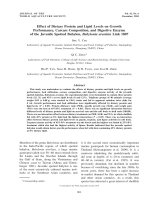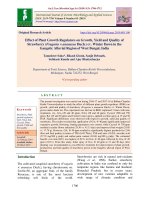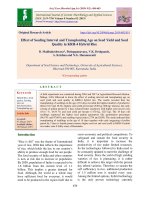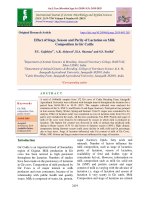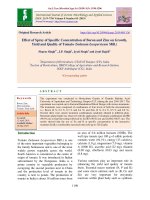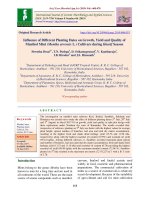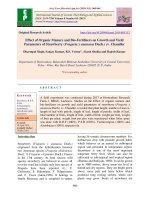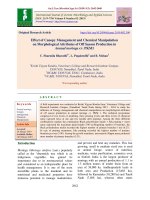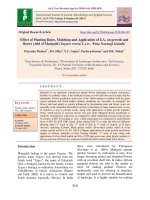Effect of sowing dates and wheat genotypes on growth, yield and production economics
Bạn đang xem bản rút gọn của tài liệu. Xem và tải ngay bản đầy đủ của tài liệu tại đây (134.14 KB, 4 trang )
Int.J.Curr.Microbiol.App.Sci (2019) 8(10): 187-190
International Journal of Current Microbiology and Applied Sciences
ISSN: 2319-7706 Volume 8 Number 10 (2019)
Journal homepage:
Original Research Article
/>
Effect of Sowing Dates and Wheat Genotypes on Growth, Yield and
Production Economics
Manoj Kumar, R. S. Singh* and I. B. Pandey
Tirhut College of Agricultue, Dholi, Dr. Rajendra Prasad Central Agricultural University,
Bihar, India
*Corresponding author
ABSTRACT
Keywords
Queen of cereals,
Wheat, Parameters,
Eco-physiological
factors
Article Info
Accepted:
04 September 2019
Available Online:
10 October 2019
An experiment was conducted at research farm of Rajendra Agricultural
University, Pusa (Samastipur), Bihar during rabi season of 2003-04 with four
sowing dates i.e., 27th November, 11th December, 25th December and 8th
January along with four test varieties i.e., K 9107, PBW 343, HP 1744 and NW
1014 under split plot design to find out suitable sowing time for newly released
wheat varieties under irrigated condition of Bihar and their economics of
production. It was found that delay in sowing beyond 11th December drastically
reduced the grain yield to the tune of 47.5 and 70.6 per cent, respectively when
sown on 25th December and 8th January with respect to normal sowing on 27th
November. Among varieties, K 9107 and PBW 343 achieved significantly higher
grain yield than HP 1744 and NW 1014 varieties. Net return and B:C ratio were
also significantly higher when wheat was sown on 27th November and followed
by 11th December. Beyond 11th December, it registered 334 and 337 per cent
decrease in net return/ha. Sowing of wheat on 8th January was found
uneconomical. Wheat varieties K 9107 and PBW 343 were found suitable for
irrigated condition of Bihar.
Introduction
Wheat (Triticum aestivum L.), the queen of
cereals, is an important crop in the world
farming. Globally, wheat occupies over 30 per
cent of the area under all food grain crops and
serves as an staple food over billions of people
in 43 countries.
In Bihar, wheat sowing stretches from mid
November to first week of January. Good crop
yield depends on a set of eco-physiological
factors coupled with the inherent yield
capacity of the crop variety. It is a known fact
that genetic make-up limits the expression of
yield in response to existing environmental
conditions.
On the contrary, unfavourable environmental
parameters do not allow the full expression of
the yielding ability of a variety. Keeping
above fact in view the present experiment was
187
Int.J.Curr.Microbiol.App.Sci (2019) 8(10): 187-190
conducted at research farm of the then
Rajendra Agricultural University, Pusa
(Samastipur), Bihar.
Materials and Methods
The field experiment was conducted at
research farm of Rajendra Agricultural
University, Pusa (Samastipur), Bihar during
rabi season of 2003-04. The soil of the
experimental plot was silty clay loam in
texture, medium in organic carbon (0.63 %),
low in available nitrogen (247.9 kg/ha), potash
(128.0 kg/ha), medium in available
phosphorus (26.80 kg/ha) with pH 7.8. The
treatment comprised of four sowing dates i.e.,
27th November, 11th December, 25th
December, and 8th January along with four test
varieties i.e., K 9107, PBW 343, HP 1744 and
NW 1014. The treatments were replicated
thrice under split plot design. The crop was
sown 20 cm apart using 125 kg seed /ha. The
crop was uniformly fertilized with 120 : 60 :
40 kg N : P : K/ha.
Results and Discussion
The data presented in table 1 had shown
significant effect of sowing dates as well as
different genotypes on plant height, leaf area
index, crop growth rate and number of tillers
per metre linear length.
Plant height recorded at harvest under sowing
on 27th November was found significantly
superior than the plant height under sowing on
25th December, and 8th January but was found
at par with the plant height under sowing on
11th December which may be due to more
congenial environmental amplitudes that
resulted in more cell elongation and hence the
plant height. Nainwal and Singh (2000) and
Lathwal and Thakrapal (2000) also observed
that growth of wheat plant was stunted under
late sown condition. Varieties had also
significant effect on plant height and
significant highest value of 100.27 cm was
recorded by K 9107 and closely followed by
NW 1014 and lowest in PBW 343 which may
be their genetic features.
Similar effect of dates of sowing was observed
on number of tillers per metre linear length.
Effect of dates of sowing on leaf area index
and crop growth rate was more pronounced.
27th November sown crop proved superiority
over other dates of sowing and the values of
leaf area index and crop growth rate decreased
with further delay in sowing the crop.
Different genotypes of wheat did not show
much difference with respect to leaf area
index. Significant lowest values of crop
growth rate and number of tillers per metre
linear length were recorded by the variety HP
1744.
The yield attributing characters were found to
have better expression in crop sown on 27th
November followed closely by 11th December
and the value declined drastically with delayed
sowing. The crop sown on 27th November
produced the highest grain yield which
drastically reduced to 47.5 and 70.6 per cent
when sowing was delayed to 25th December
and 8th January, respectively which might be
due to rise in temperature above 15 ºC during
grain filling stage in delayed sowing and also
due to reduction in duration of grain filling
because, grain yield decreases by about 3-4
per cent for each 1ºC rise in temperature
above 15 ºC during grain filling stage
(Wardlaw and Wringley, 1994). Varieties had
also significant effect on grain yield.
Similarly, highest grain yield was obtained in
K 9107 which was at par with PBW 343 and
significantly higher than HP 1744 and NW
1014. The grain yield of wheat varieties, K
9107 and PBW 343 reduced drastically when
sowing was beyond 25th December.
188
Int.J.Curr.Microbiol.App.Sci (2019) 8(10): 187-190
Table.1 Effect of sowing dates and different genotypes on plant height, leaf area index,
crop growth rate and number of tillers per metre linear length.
Treatments
Date of sowing
27th November,
11th December
25th December
8th January
CD (p=0.05)
Varieties :
K 9107
PBW 343
HP 1744
NW 1014
CD (p=0.05)
Plant height
at harvest
(cm)
93.78
92.19
85.83
84.00
4.02
Leaf Area
Index (LAI)
at 90 DAS
3.96
3.74
3.49
3.24
0.21
Crop Growth
Rate (60–90
DAS)
3.06
2.49
2.31
1.20
0.39
Number of tillers/
metre linear length at
harvest
65.92
63.08
52.33
45.83
3.83
100.27
79.22
81.19
95.11
4.02
3.60
3.41
3.46
3.58
NS
1.72
1.82
1.41
1.48
0.39
58.25
55.58
53.58
59.75
3.83
Table.2 Effect of sowing dates and different genotypes on yield, gross return, net return
and B : C ratio of different wheat genotypes.
Treatments
Date of sowing
27th November,
11th December
25th December
8th January
CD (p=0.05)
Varieties :
K 9107
PBW 343
HP 1744
NW 1014
CD (p=0.05)
Grain yield
(q/ha)
30.68
28.29
16.12
8.77
1.11
Gross return
(Rs/ha)
26579
24565
14043
768
962
Net return
(Rs/ha)
16188
14174
3653
(-) 2709
1040
B : C Ratio
22.39
21.60
19.55
20.33
1.11
19430
18764
17000
17680
962
9039
8373
6610
7283
1040
0.87
0.81
0.64
0.70
0.10
However, The NW 1014 produced maximum
grain yield when sowing was delayed to 8th
January. Wheat varieties - K9107 and PBW
343 also earned higher net return (Table 2). K
9107 and PBW 343 recorded higher yield
under timely sown condition while NW 1014
performed better when sown on 8th January.
Gross return, net return and B : C ratio follow
the same trend to that of grain yield and all
these three economic parameters were found
significantly superior under 27th November
sowing than later delayed sowings. Among
1.56
1.37
0.35
-0.26
0.10
varieties, K 9107 showed its superiority over
other varieties with respect to gross return, net
return and B : C ratio. Grain yield of wheat
varieties reduced drastically when sowing was
done beyond 25th December and hence,
sowing of wheat beyond 25th December was
not found economical.
References
Lathwal, O.P. and Thakrapal, S. K. (2000).
Performance of wheat varieties sown
189
Int.J.Curr.Microbiol.App.Sci (2019) 8(10): 187-190
on different dates under rainfed
condition. Field Crop abstracts. 2000
53(6): 500.
Nainwal, K. and Singh, M. (2000). Varietal
behavior of wheat () to date of sowing
under Tarai region of Uttar Pradesh.
Indian J. Agron. 45 (1): 107-113.
Wardlaw,I.F. and Wringley, C.W. (1994).
Heat tolerance in temperate cereals :
An overview. Australian J. Plant
Physiology. 21: 695-703.
How to cite this article:
Manoj Kumar, R. S. Singh and Pandey, I. B. 2019. Effect of Sowing Dates and Wheat
Genotypes on Growth, Yield and Production Economics. Int.J.Curr.Microbiol.App.Sci. 8(10):
187-190. doi: />
190
